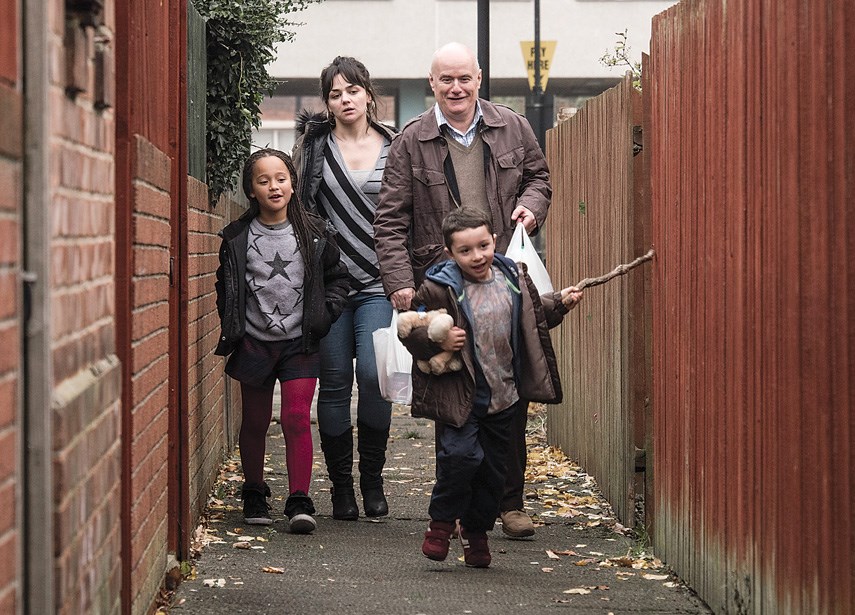I, Daniel Blake. Directed by Ken Loach. Starring Dave Johns and Hayley Squires. Rating: 10 (out of 10)
If you’re a Canadian or a Brit who has spent any time in the U.S., you’ve likely fended off accusations and urban myths about our health care and welfare systems, and how recipients die while waiting for aid.
Well, here comes I, Daniel Blake making liars of us all.
Ken Loach’s film is a scathing look at how one man gets caught in a web of red tape in Britain’s welfare system, aptly released here in Canada the week that May Day labour events are being held worldwide. Screenwriter Paul Lavery spoke at the Glasgow May Day rally, which featured an image of Daniel Blake prominently on its poster.
This is the 14th collaboration between Loach and screenwriter Lavery (2006’s excellent The Wind That Shakes The Barley won them their first Palme d’Or) and the stories in I, Daniel Blake were culled from extensive interviews with the unemployed, welfare recipients and providers.
The film is an urgent call to action to better serve the poor and underserved, a class increasingly left behind as technology replaces human contact and old-fashioned common sense.
After suffering a heart attack and warned by doctors not to return to work, 59-year-old widower Daniel Blake (Dave Johns) is denied support allowance from an agent with no particular health training who asks him a list of irrelevant questions over the telephone. Endless hold music (I have a new hatred for Vivaldi’s “Four Seasons”) and several infuriating phonecalls later, Dan is directed to the job-seeker’s office to apply for an appeal.
There he meets single mum Katie (Hayley Squires), whose only option to get her two children out of a homeless shelter was to accept a flat in Newcastle, hundreds of miles from family in London. Dan, a carpenter by trade, does repairs around Katie’s new apartment, where grime is the only thing holding the bathroom tiles together.
Dan is an honest victim in a crackdown partially meant to flush out abusers of the system and partly designed to minimize payouts by maximizing stress and inconvenience to the client. There are mandatory resume-writing workshops and days spent pounding the pavement looking for jobs that Dan shouldn’t even be doing in his condition. The overseer at the job-seekers’ office demands proof that he looked for a job: hours logged on a computer or a selfie on his cellphone, perhaps? Dan is a master woodcarver but has never gone anywhere near a cell phone or a computer keyboard. He tries his hand at printing out the required forms for free at the library, only to be confronted with error screens and have his time run out. It’s one maddening scenario after another.
Dan is a classic case of how quickly the honest and hard-working can find themselves in an hours-long food bank queue, an honest victim in a crackdown meant to flush out abusers of the system. The most heart-breaking scene of the film occurs there, as Katie breaks down from hunger and desperation; it’s a moment not easily forgotten. The film presents several underdog stories, one more infuriating than the next. It’s also a testament to the inherent goodness of people despite their truly desperate circumstances.
The emotional impact of the film lies in its raw, documentary feel and the natural performances of Johns and Squires; the dialogue is akin to eavesdropping on real conversations.
Eighty-year-old director Ken Loach has been shedding light on social-justice issues in Britain since 1966’s Cathy Come Home. This most recent film won the Palme d’Or at Cannes 2016 (Loach is among only a handful of directors to have won twice), not to mention a Best British Film BAFTA, the Cesar, and Most Popular International Feature here at the Vancouver International Film Festival.
And lest you think the film presents an exclusively British portrait of homelessness and underemployment, be reminded that food bank use here in B.C. is at an all-time high, according to a HungerCount 2016 report.
“We all need the wind at our back every now and again, don’t we?” But Daniel Blake finds no such safe harbour in his labyrinthine journey through the welfare system, and his “citizen” speech at the end of Loach’s essential film is sure to be adopted as the battle cry of the dispossessed for years to come.



